Podcast: Play in new window | Download
 Travis Cody is the author of the book Cure Overwhelm Now where he talks about his experience with technology obsession and removing himself from all technological devices for 30 days. He talks about all the different ways that we are being overwhelmed. These technological devices are taking up and absorbing too much of our energy, time, and they are causing us a lot of stress.
Travis Cody is the author of the book Cure Overwhelm Now where he talks about his experience with technology obsession and removing himself from all technological devices for 30 days. He talks about all the different ways that we are being overwhelmed. These technological devices are taking up and absorbing too much of our energy, time, and they are causing us a lot of stress.
Travis Cody’s greatest joy in life is showing stressed out, overwhelmed people how to find the time to actually live their lives and pursue their dreams. He is the creator of The Overwhelm Cure. After surviving his 30 Day experiment without modern technological devices, he now shows others how to live a life they love.
Zeb’s Take – Overcome Technology Obsession
I had a great time talking to Travis today. Travis is very excitable. I really liked all the stuff he was saying and how he was able to break his technology obsession and take himself away from all those technological devices for 30 days. I know there’s no way currently that I could make that happen although it does sound pretty appealing. To be able to break away, especially in this fast paced world that we live in. When I’m doing internet marketing, I’m managing it for a variety of different businesses so I’m always posting and responding to Facebook posts and Twitter posts. I have to be pretty active and present there, it does become very overwhelming. I can definitely see the value in wanting to break away from that for a while.
Travis brought up the point that we need to set time aside to unplug from our mobile devices and just take a step away. Do things we would normally do without being attached to our smart phones. He brought up the point that, talking with teenagers, if you take away a phone or other device from a teenage they go berserk because nowadays people are just attached to these devices. When I was younger, I’m 33 years old now, you didn’t have a cell phone, you didn’t have this technology that you carried around with you. Now it is completely different.
I think that technology is going to be more and more incorporated in our lives. I think technology is great. I’m a big advocate of technology, especially in cases where we are using it in social interactions and creating new connections. Technology obsession, dependency is one thing and using it to have an impact, make a  difference is another. I think sometimes people fall into the dependency state of having these mobile devices and not so much using them to impact the world to make the world a better place. As a society we need to realize our technology obsession, come together and educate others on the difference between using these devices in an appropriate way and in an inappropriate way. I’m just as guilty of this as much as anyone else. If you go out to a restaurant you see half the people there on their mobile phone not talking with other people, not engaging with their surroundings. That’s one of the downsides of this technology and it’s something we need to be conscious of.
difference is another. I think sometimes people fall into the dependency state of having these mobile devices and not so much using them to impact the world to make the world a better place. As a society we need to realize our technology obsession, come together and educate others on the difference between using these devices in an appropriate way and in an inappropriate way. I’m just as guilty of this as much as anyone else. If you go out to a restaurant you see half the people there on their mobile phone not talking with other people, not engaging with their surroundings. That’s one of the downsides of this technology and it’s something we need to be conscious of.
It is also important to step away because it does help clear your mind. When you have all these things bombarding you: messages, beeping, phone calls, and all that stuff, it is important to step away. De-stress, clear your mind so that when you do go back to work you are more focused, more determined and you will have a larger chance at success, a larger chance to do something worthwhile.
It was a blast talking with Travis today.
For our listeners, we are creating a Facebook Course. We are going to walk people through Facebook, beginning to end, how I do it for businesses. If you are interested in finding out more about this course contact me, since you are a listener I want to do something special for you, so send me an email and let me know you are interested and I put together a deal for you. Zeb@WelbornMedia.com
Find out more about Travis cody and his book Cure Overwhelm Now
Visit CureOverwhelmNow.com and find his book at bookstores.
Quotes
- “If there is ever something where you are engaged in it and you just sort of lose all sense of time and things are just going, that’s the flow. When something happens to interrupt that, […] you lose that flow state and getting back to that point is really difficult.”
- “80% of your stress is completely fictional. You are not as stressed out as you think you are.”
- “Most people could get rid of most of their stress if they would just learn how to manage their technology, particularly their cell phones, Facebook, and email.”
- “People have this really weird belief that they have to answer the email. That they have to, they can’t ignore the email, even if it’s just for a couple hours.”
- “I don’t know when it happened, but in the last 4 or 5 years there’s been this strange shift where the idea of having boundaries has completely evaporated.”
- “People really kind of feel like, if I text you, you owe me a response immediately. In some weird way it’s like, this ownership– I’m owning your time right now. Same with email: if you don’t email me back within an hour that means you hate me. It’s ridiculous, but that is what I am finding with a lot of people.”
- “There is so much power and potential to [technology], but we just don’t know what to do with it. We are completely wasting it. In some ways we are just collision coursing our own lives through the amount of wasted time we are having.”
- “Live life on your own terms instead of being run from pillar to post by everyone else.”
- “We need a bit of creativity in order to fix the problems we’re creating for ourselves and, at the same time, we are creating a generation of people that don’t know how to even daydream. It has scary implications for the future.”
More from the Interview
After college Travis Cody moved to LA and did some work in the film industry. Worked at Universal Studios before doing development work and writing for producer Jonathan Crane. He did that for about 10 years. Then his first book came out and he had a little success there. That’s when he branched out and started doing independent production and writing on his own. He has a couple best-selling books and is currently working on a documentary.
The first book was Celebrity Rules(!), it was a humor book making fun of celebrity culture.
Cure Overwhelm Now, the jump from Celebrity Rules to Cure Overwhelm Now… how do you make that…
The idea for Cure Overwhelm Now came from an experiment he did on himself. When he was still working with Jonathan Crane he was maxed out capacity wise. It didn’t matter how much time he put in in the office or at home, in fact, it seemed like the harder he worked the further behind he got. He was at a seminar, the speaker started talking about this concept of pattern interrupt. Which is when you are in one of those moments, the flow state. If there is ever something where you are engaged in it and you just sort of lose all sense of time and things are just going, that’s the flow. When something happens to interrupt that, you lose that flow state and getting back to that point is really difficult.
That whole concept of the interruption causing him to be less productive. He started to monitor himself. He started to make a mark every time he reached for his cell phone. After a couple hours he was surprised with how many marks he made. What he realized was that it wasn’t that he was stressed and didn’t have enough time, it was that he was allowing these cool gadgets take over. He turned off the ringer on his phone and his productivity went way up.
Then he thought, “what if I just turn everything off.”
At that time he had a project fall through and was going to have some downtime for about 5 weeks. He decided to do it. He turned off his cell phone, computer, internet, TV, radio and Xbox. He wanted to find out if someone could function in today’s society, especially in a place like Los Angeles, with nothing other that a landline.
It ended up being a hugely transformative month for him. He did a lot of research on technology obsession and addiction and about the neuroscience of what our interaction with Google and our cell phone is doing physically in the way that we process our information. Six months later he ran into a publisher who had heard about the experience and offered Travis a book deal. That’s how the book came about.
The book is a day-by-day diary so you can see what is going through his head in the moment. Then there is the looking back on it with what he knows now and how does that reflect on the experience he had. Then there is a lot of research in there to validate the points that he’s making.
“80% of your stress is completely fictional. You are not as stressed out as you think you are.”
Most people could get rid of most of their stress if they would just learn how to manage their technology, particularly their cell phones, Facebook, and email.
“People have this really weird belief that they have to answer the email. That they have to, they can’t ignore the email, even if it’s just for a couple hours. That idea is so foreign to them. Same with text messaging.”
“There’s been this sort of weird unwritten rule that if I don’t respond to a text message immediately then it means something.”
“I don’t know when it happened, but in the last 4 or 5 years there’s been this strange shift where the idea of having boundaries has completely evaporated.”
He shares, going back to my Celebrity Rules book, there’s this weird thing about if you are a celebrity we feel like we own you. Now with cell phones people really kind of feel like, if I text you, you owe me a response immediately. In some weird way it’s like, this ownership– I’m owning your time right now. Same with email: if you don’t email me back within an hour that means you hate me. It’s ridiculous, but that is what I am finding with a lot of people.
When I unplugged everything the most difficult thing to get out of was having the cell phone. The first few days of getting in my car and driving around I felt so awkward and weird because I just didn’t have a phone on me.
One of the experiences Travis remembers is dinner with his friends. They would get together every Monday. Their first dinner after Travis cut off his technology his friends said they noticed that his energy had changed, they said that he was just so zenned out. It shocked Travis, it had only been three days, the only thing he changed was taking away the technology and everyone noticed a difference in him.
He says, I saw more of the city of Los Angeles in 30 days than I had in the entire 15 years I’ve lived here. I ended up being more social. I actually made more new friends in 30 days than I had the previous 4 years.
“The amount of time that I had was astounding to me.”
He bumped into a neighbor, found out they were an opera singer, got invited to a performance. He met a few of her friends and expanded his social circle with 6 new people.
He stumbled upon a Japanese garden and found a crazy weird motorcycle event going on people were doing tricks in the parking lot.
He says, the first day he plugged back in was miserable. He checked his email, his shoulders hurt, he had a headache, he was really grouchy and impatient, he forgot to eat. He realized that the majority of his emails were completely pointless. “Within a week I was right back to where I was before.”
After some time he came up with a system in his own personal life so that it wasn’t completely overwhelming. That’s what led to the principles in his book.
“There is so much power and potential to [technology], but we just don’t know what to do with it. We are completely wasting it. In some ways we are just collision coursing our own lives through the amount of wasted time we are having.”
 To overcome technology obsession:
To overcome technology obsession:
Don’t sleep with your cell phone next to your bed. Leave it in another room or across the room. Don’t check your email/facebook/texts first thing in the morning. Travis encourages you not to check your phone or email until you get to the office if you can. Or wait two hours after you wake up. Set up a specific time to check email one or two hours a day. Those two things will minimize the amount of stress you are feeling in life. You will be more productive, you will have more free time.
“Live life on your own terms instead of being run from pillar to post by everyone else.”
The first thing someone with a technology obsession should do is move your phone across the room when you are asleep. Then progress from there to where you are not checking anything the first few hours of the day and the last hour before you go to bed.
One of the more advanced techniques that Travis sometimes recommends is a Technology fast. Where you choose, even if it’s just for a few hours, to turn everything completely off.
“There is something to be said for allowing your brain time to process the events of the week.”
When he asked a professor what the biggest difference in his students was over the last 15 years the professor said that his students didn’t know how to daydream. The are constantly distracted by technology. To solve problems you need to show some creativity and we are creating a generation of people who don’t know how to daydream. He says, it has scary implications for the future.
For me success is having a life where I am able to do the things that I love and enjoy to do when I want to do them without the pressures of worrying about where is the money coming from or is there someone I have to answer to.



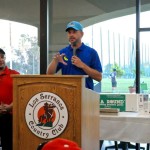
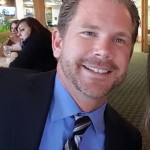

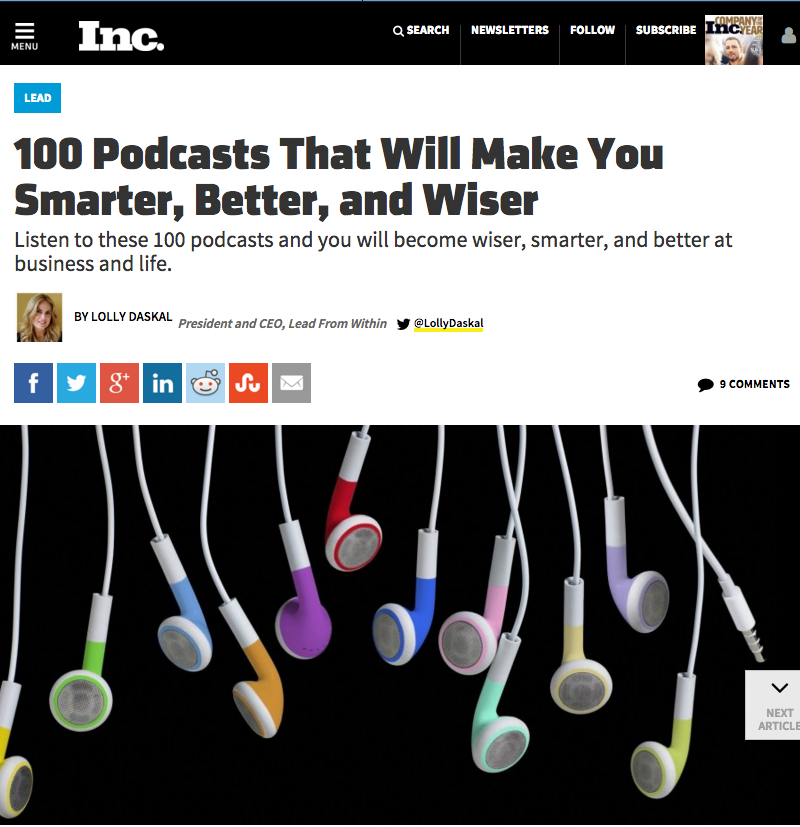 Check out the entire post: 100 Podcasts That Will Make You Smarter, Better, and Wiser
Check out the entire post: 100 Podcasts That Will Make You Smarter, Better, and Wiser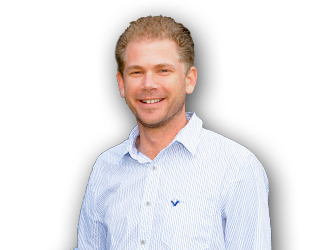





















 “The first things leaders need to do is to realize that they impact the environment or the context in which people work. Very often what leaders do is they look at the mistakes employees make and they blame the employee, and they’ve got to stop doing that.”
“The first things leaders need to do is to realize that they impact the environment or the context in which people work. Very often what leaders do is they look at the mistakes employees make and they blame the employee, and they’ve got to stop doing that.”
 difference is another. I think sometimes people fall into the dependency state of having these mobile devices and not so much using them to impact the world to make the world a better place. As a society we need to realize our technology obsession, come together and educate others on the difference between using these devices in an appropriate way and in an inappropriate way. I’m just as guilty of this as much as anyone else. If you go out to a restaurant you see half the people there on their mobile phone not talking with other people, not engaging with their surroundings. That’s one of the downsides of this technology and it’s something we need to be conscious of.
difference is another. I think sometimes people fall into the dependency state of having these mobile devices and not so much using them to impact the world to make the world a better place. As a society we need to realize our technology obsession, come together and educate others on the difference between using these devices in an appropriate way and in an inappropriate way. I’m just as guilty of this as much as anyone else. If you go out to a restaurant you see half the people there on their mobile phone not talking with other people, not engaging with their surroundings. That’s one of the downsides of this technology and it’s something we need to be conscious of.


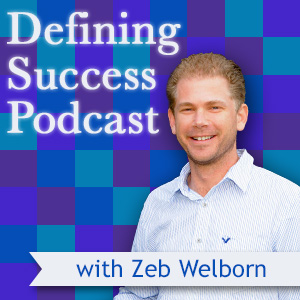











 Dr. Mollie wrote a book called Walking with Justice about her greatest life mentor Judge Max Rosenn. She says he’s hard to describe and quantify, his colleagues referred to him as a Judge’s Judge. He was a prominent federal judge on the 3rd circuit court of appeals and, to this day, he is still one of the most cited jurists in American history. While by his side she saw portraits, law libraries, even a whole federal building dedicated to him. While he was still alive they renamed the building that he went to work to everyday. He had a great deal of impact.
Dr. Mollie wrote a book called Walking with Justice about her greatest life mentor Judge Max Rosenn. She says he’s hard to describe and quantify, his colleagues referred to him as a Judge’s Judge. He was a prominent federal judge on the 3rd circuit court of appeals and, to this day, he is still one of the most cited jurists in American history. While by his side she saw portraits, law libraries, even a whole federal building dedicated to him. While he was still alive they renamed the building that he went to work to everyday. He had a great deal of impact.